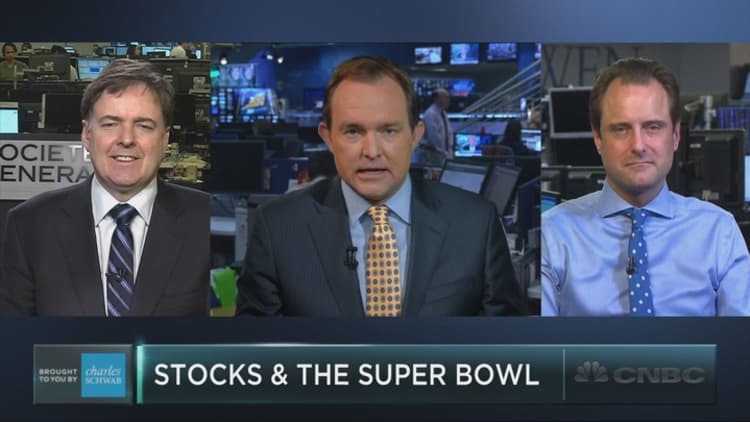
It is the opposite of sound investment advice: Buy stocks if a given team wins the Super Bowl, and sell if the other team takes it. But the so-called Super Bowl indicator merits attention from investors not because it is wise, but because of the precise reason why it is stupid.
Likely coined in 1978 by The New York Times' Leonard Koppett, the idea is that stocks tend to rise in years when a member of the old National Football League wins the big game and fall when an old American Football League team wins. The would mean a Denver Broncos' victory over the Carolina Panthers on Sunday would be bearish.
The indicator has enjoyed an impressive record of correctly calling the market but has been roundly critiqued by many, including Koppett, for being an absurd way to invest — since there is obviously no rational connection between a football game and stock performance.
However, changing your allocation because of where a ball lands is not the only bad way to choose where to put your money. Wall Street is full of terrible ideas, and for a very good reason: There is a desire for them.
Like most things in life, there is a great deal of unpredictability in stock market returns. However, unlike the outcome of a horse race, the resting place of a roulette ball or the attractiveness of the passenger sitting next to you on a plane, the market's performance in a given year has profound importance for many individuals, not to mention for the global economy. This makes its unpredictability even more maddening, and the possibility that it could become predictable even more tantalizing.
Seen in this light, the "Super Bowl indicator" is not a harmless morsel of market trivia, but actually a cruel joke. Are you five years away from retirement, and trying to decide whether to keep the bulk of your money in stocks in an attempt to make up for lost time, or are you going for the safety of bonds and resigning yourself to meager gains and a downgrade in lifestyle? The decision is easy: Just watch the Super Bowl! Ha, ha.
The risk of investors taking the Super Bowl indicator seriously is likely low. However, other market timing strategies can appear more legitimate. For instance, some judge how good the year will be by seeing how good January was, a technique known as the "January barometer." This looks like an effective way to call the market, too – until one remembers that since stocks tend to rise over time, the market tends to rise in both January and in the full year. And never mind that once the calendar page turns, 8.3 percent of the year is already in the rear-view mirror.
Read More Why you should totally ignore the 'January barometer'
Along different lines, one method that has caught attention is buying a stock or stocks when a rising 50-day moving average crosses above a rising 200-day moving average (forming a "golden cross") and selling when the opposite condition occurs (a "death cross"). Of course, all this tells us is that a stock has already risen or fallen.
The list of bad ways to invest can continue on and on. And as many will tell you, there is a reason why these plays cannot work in the long run: If a given strategy utilizes publicly accessible information to yield greater returns without greater risk, it will be pounced on until the quasi-arbitrage opportunity no longer exists.
To that generalized critique, some would add that if an individual found a way to beat the market, the investor would not share it, which uncomfortably implies that all who give investment advice are charlatans.
Read More Buy Apple—the bulls will win this 'war': Trader
But rather than direct their suspicion outward, investors would be better suited to direct it inward. As humans, we want to believe that the market is predictable, because it would make our decisions easier. (And as a corollary, if we cannot make the correct moves, we at least want to be able to blame our mistakes on others who provided the bad information.) But investing decisions are not easy. They are hard.
That's why you should assess your needs, assess your risk tolerance, assess your expected returns and ignore supposedly sure-fire prediction techniques. And enjoy the game.






